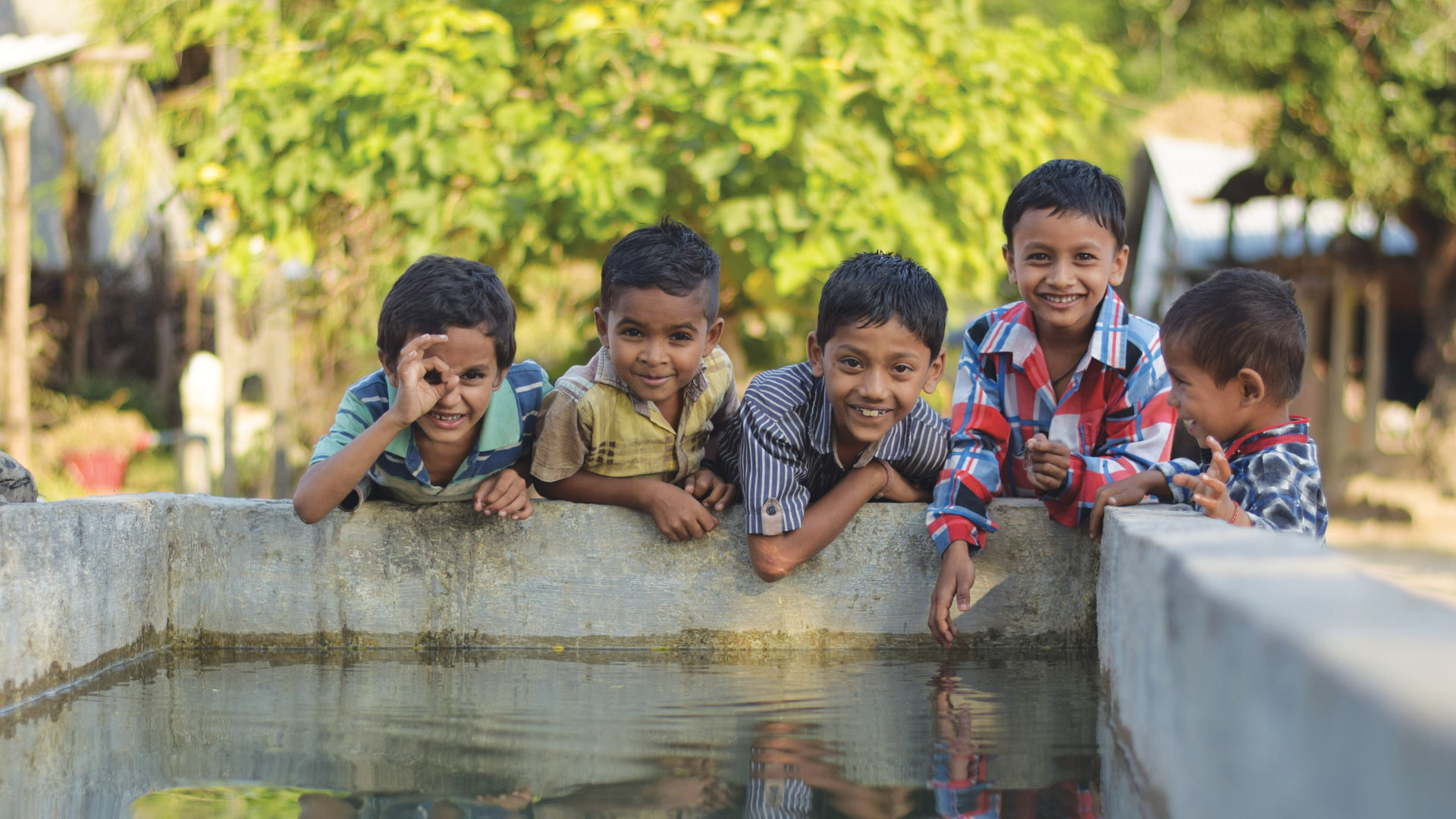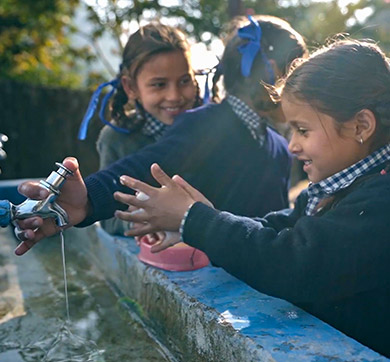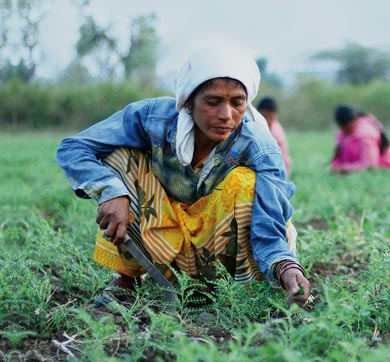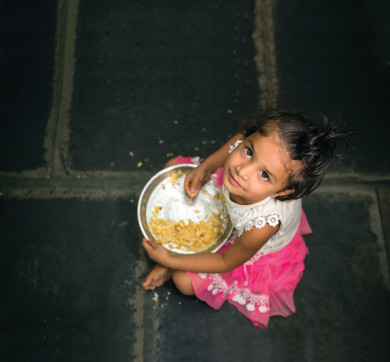August 2021 | 1610 words | 6-minute read
"When the well’s dry, we know the worth of water,” said American author and inventor Benjamin Franklin. Most of us who are used to water gushing out of our taps seldom realise what a privilege it is to have access to clean water. The sad truth is that millions of people in India lack access to clean water and efficient sanitation. The problem has been aggravated in the pandemic, leaving people unable to practise one of the most effective modes of preventing the spread of Covid-19.
The right to clean water is a fundamental right of every citizen, mandated in the United Nations Development Programme’s 6th Sustainable Development Goal, which seeks to ensure clean water and sanitation for all.
In these circumstances, the Tata Trusts stepped in to make a difference. The Tata Water Mission (TWM) has three critical components: water, sanitation and hygiene (WaSH). The programme works towards rainwater conservation, sustainability of water sources and provision of clean water.
The mission is currently making good progress in Rajasthan, Gujarat, Maharashtra, Karnataka, Andhra Pradesh, Jharkhand, Assam, Nagaland, Mizoram, Uttar Pradesh, Uttarakhand, Himachal Pradesh, Punjab and Leh.

Divyang Waghela, head, WaSH, Tata Trusts, says, “The Tata Water Mission aims to improve the quality of life of rural underserved communities by providing them safe, assured and adequate drinking water, improving sanitation and hygiene services and ensuring year-round availability of water.”
The Trusts’ strategy has the following key pillars:
- Reduce and reform water demand
- Restore and recharge water availability
- Operate and maintain water supply systems by empowering local users
- Preserve and enhance water quality
- Ensure continuance of safe sanitation, hygiene and waste management, including menstrual waste
Information is key
The programme begins with baseline data collection. Mr Waghela says, “We conduct a study to understand the local water supply situation such as source, storage, treatment and distribution, along with the community’s knowledge, aptitude and practice with reference to water.”
Once the team understands prevailing issues of water availability and behaviour patterns and practices of local communities, they design a specific intervention contextual to the needs of local people. The solution may entail the development of infrastructure or communication strategy to induce behavioural change. “Our goal is not to offer prescriptions. We guide them to understand the problem and build their capabilities so that they might seek solutions on their own. This builds sustainability into the programme,” he adds.
The Trusts insists on three preconditions before an intervention is devised. The community must agree to make a nominal financial investment towards the solution; this ensures a sense of ownership. It must take on the operational and maintenance responsibility so that when the Trusts exits from the programme, the system continues to function smoothly.
The third condition seeks to rule out the perpetuation of social evils. Mr Waghela says, “In rural areas, marginalised communities sometimes don’t get involved in community efforts because of caste restrictions. We insist that all sections of society should be a part of the programme.”
Once the community accepts these conditions, the Trusts works on a communication plan to ensure participation of all community members. They interact with different target groups in the community and understand their living standards and priorities.
The Trusts also creates a village water committee, with representation from all the mohallas/wards (an area in the village), to take complete ownership of the programme. Mr Waghela says, “We involve them in the decision making process, build their capacity and enhance their knowledge. They assume responsibility for the project’s success.”
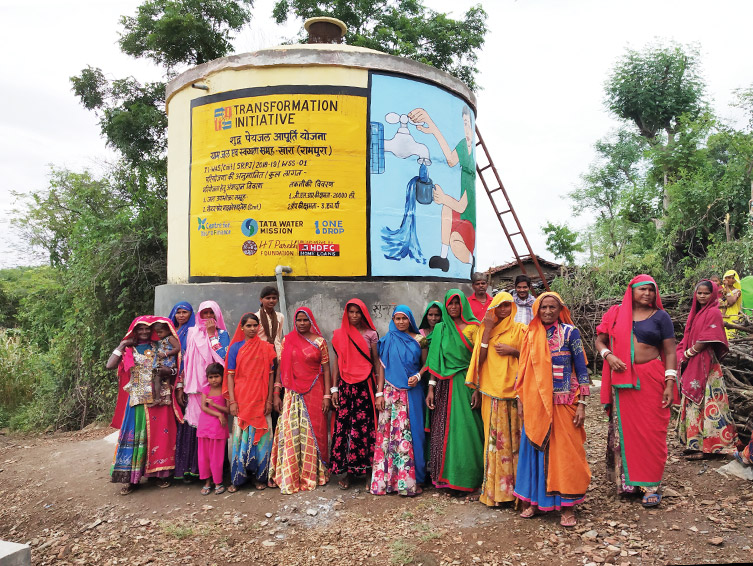
Women and water
From the very beginning, the mission gave women a key role in the decision making process. Mr Waghela says, “Women and water are very closely related. Ninety percent of the time in rural India, women are responsible for water management, including the drudgery of walking long distances to fetch water, cleaning the house, etc. So we ensure that women’s requirements are considered in the design of the water system.”
It is women, more than men, who see wisdom in making a capital investment towards the solutions suggested. Once the system is up, the women take responsibility for water quality management and for collecting the water tariff.
Triple-pronged approach
The Trusts approaches the problem of water from the standpoint of accessibility, conservation, and sanitation and hygiene. The availability of water is not the only problem that besets the community; often the water quality poses a health hazard. Chemical contamination in the form of high levels of fluoride, nitrate or arsenic, and even salinity is rife, as is microbiological contamination through the presence of bacteria and viruses.
Resolving these issues requires the deployment of innovative and affordable technological solutions suitable to Indian conditions. The Trusts has identified a technology to remove arsenic and fluoride, with a pilot implementation undertaken in Assam and Rajasthan.
Mr Waghela says, “We collaborate with the central and state governments to supplement their efforts, in making communities self-sustainable for their basic needs of water, sanitation and hygiene.” This work is on in 12 states.
Additionally, the Trusts supports the government through a fellowship programme called the Zilla Swachh Bharat Programme, part of a partnership project to achieve the objectives of the Swachh Bharat Mission (Gramin). Through this programme, the Trusts appointed more than 500 professionals to assist the district collectorate in solving sanitation challenges, which could be behavioural, technological or related to supply or data issues.
The professionals, attached to the Ministry of Jal Shakti’s department of drinking water and sanitation, offer their inputs at the national level for policy and operational changes.
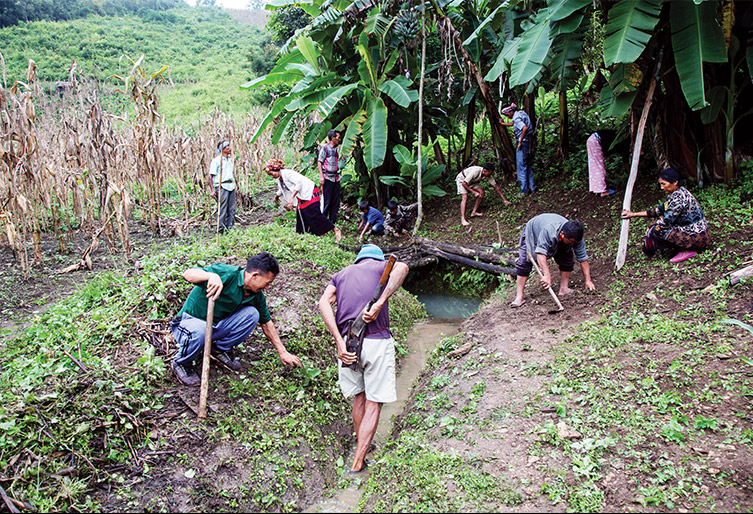
Protecting water sources
Water, a common property resource, is used for various purposes, especially agriculture. Most communities neither store rainwater, nor treat and reuse the enormous amounts of wastewater generated. This leads to the widening of the demand-supply gap for water in India, adversely impacting drinking water sources.
Hilly regions are one of the most severely impacted regions as springs, the primary sources of water, dry up due to deforestation and climate change, bringing the community to the brink of despair.
Tata Trusts, through its springshed management programme, works towards the rejuvenation of springs in the hilly regions of Uttarakhand, Himachal Pradesh, Nagaland and Mizoram. As a part of the process, a study is done into the geo-hydrological origins of the near-depleted springs to figure out the area of land that must be recharged. The results are profiled in the dhara patri, which captures data on the spring’s origin and volume of circulating water over time; this analysis helps in contributing to the springshed programme for groundwater management.
“With the help of this information,” says Mr Waghela, “we, along with the community, plant recharging vegetation in the area. Other efforts like control trenching and bunding are undertaken with the forest department’s help for rejuvenating the spring water.”
The Trusts has successfully conducted such work in Uttarakhand, Himachal Pradesh, Nagaland and Mizoram and is now planning to collaborate with the central government on springshed management.
In regions that depend on rainfall, such as Rajasthan, Maharashtra, Gujarat and Karnataka, the Trusts has implemented rainwater harvesting, river widening, pond deepening and borewell recharging to raise the water table. Mr Waghela says, “We need to catch and save every drop of rainwater. The more water gets into the aquifer below the ground wherever possible, the lesser the risk of loss of water through evaporation.”
Integrated approach
The Trusts believes that multi-thematic interventions are required to bring about irreversible change in people’s lives. New water projects are initiated in districts where the Trusts has a presence or is planning to work through an integrated approach.
Mr Waghela says, “Interventions in the areas of livelihood, water, sanitation, health, nutrition and education work best if they are integrated. We work with underserved communities, engaging with the state government and district administration and playing a catalytic role in filling the gap areas in sourcing quality resources, value addition and innovation.”
Challenges aplenty
Resolving the water woes of the nation demands a high level of dedication and an innovative mindset to meet the varied challenges thrown up in a country as diverse as India. The Trusts is working to ensure that the community has a say in devising solutions. It is also partnering with research and academic institutions, foundations, and non-government organisations who work at the field level, to bolster the impact.
Mr Waghela says, “With the new challenges emerging in the sector, we need more innovative thinking to meet this challenge with a futuristic approach.”
The key to this conundrum lies in engaging more closely with the government ecosystem and building social capital at the ground level. The Trusts is actively engaged in empowering champions at the grassroot levels to take the movement further and to preserve and safeguard water, one of the most critical resources required to sustain human life.
In the last 5 years, TWM has covered over 4 million beneficiaries from over 5,500 villages in 15 states across India. TWM’s initiatives include both direct on-ground interventions as well as knowledge and policy level partnerships.
Going forward, TWM will look at ‘One Water’ in its intervention geographies from the first-principles approach, by assessing (i) how much water is needed by the communities and what is the water needed for, (ii) how much water is available and in what forms is it available, (iii) how to bridge the gap between requirement and availability in the most effective, efficient and sustainable manner.
Read more about the Tata Trusts' Tata Water Mission in this compendium 'One Water, One Community: Sustaining the Elixir of Life.' The compendium covers stories from different states, focussing on the Tata Trusts’ One Water concept.
Tata Companies facilitating the Mission
- Tata Chemicals supported over 50,000 households by selling Tata Swach water purifiers, through rural social entrepreneurs in Nagaland, Mizoram, Arunachal Pradesh and Assam.
- Tata AIG has funded a solution with mechanical equipment for sewer cleaning that sanitation workers can safely operate. The equipment will be tested by the Ulhasnagar Municipal Corporation in Thane, Maharashtra.
- Tata Capital has funded Mission Garima project which aims to ensure a safe and healthy work environment to sanitation workers.
- Tata AIA has funded a menstrual hygiene programme in Maharashtra and Rajasthan.
- Titan Company has been funding the Tata Water Mission in Uttarakhand for the past 4 years.
- Tata Consumer Products has funded the Tata Water Mission in Assam and Himachal Pradesh.
- Tata Projects Ltd has collaborated with the mission to provide safe drinking water using technology based solutions in Andhra Pradesh, Telangana and Maharashtra.
—Cynthia Rodrigues
